The Vanishing Aral Sea
I knew from the moment our car started slowing down, eventually coming to a full stop, that this was going to be an amazing experience. Any trip that begins with us being forced to stop because of a herd of camels crossing the road, urged on by a man on horseback, is bound to be fantastic.
Kamal, our guide, just grinned good-heartedly when we all jumped out of the cars and whipped out whatever equipment we brought to record this moment for posterity. Although, in reality, the only one in our group with the potential to bore posterity with her pics was Mary, with her large family waiting for her in the States. We had only met a month prior to the trip but hit it off right away because of her down-to-earth nature. From our previous chatting I knew that her mandate to teach teachers in the Nukus region was from the US State Department. The other two members of our group had no kids yet. They were young doctors working for Doctors Without Borders. I met Gab, who organized the trip, in person only 3 days before setting off. Dina was a new arrival in Nukus who, despite still suffering from mild jetlag, had jumped at the opportunity to join us on our Aral Sea adventure.
I had no intention to bore Jess with our pictures. Ok, maybe one or three max, and just for a few minutes. And definitely no videos! Not even a short one. We still remember a couple we used to know who, one evening many years ago, summoned us to their TV room where the expecting mother inflicted a half-hour of in-vitro ultrasound video on us. “What the heck is that gray smudge?” I remember thinking. It was one of the longest thirty minutes of my life.
“There is a small camel farm not too far from here,” our guide Kamal explained the source of our impromptu delay. With the camels gone, we piled back into our two cars and resumed our trip to see what was left of the Aral Sea.
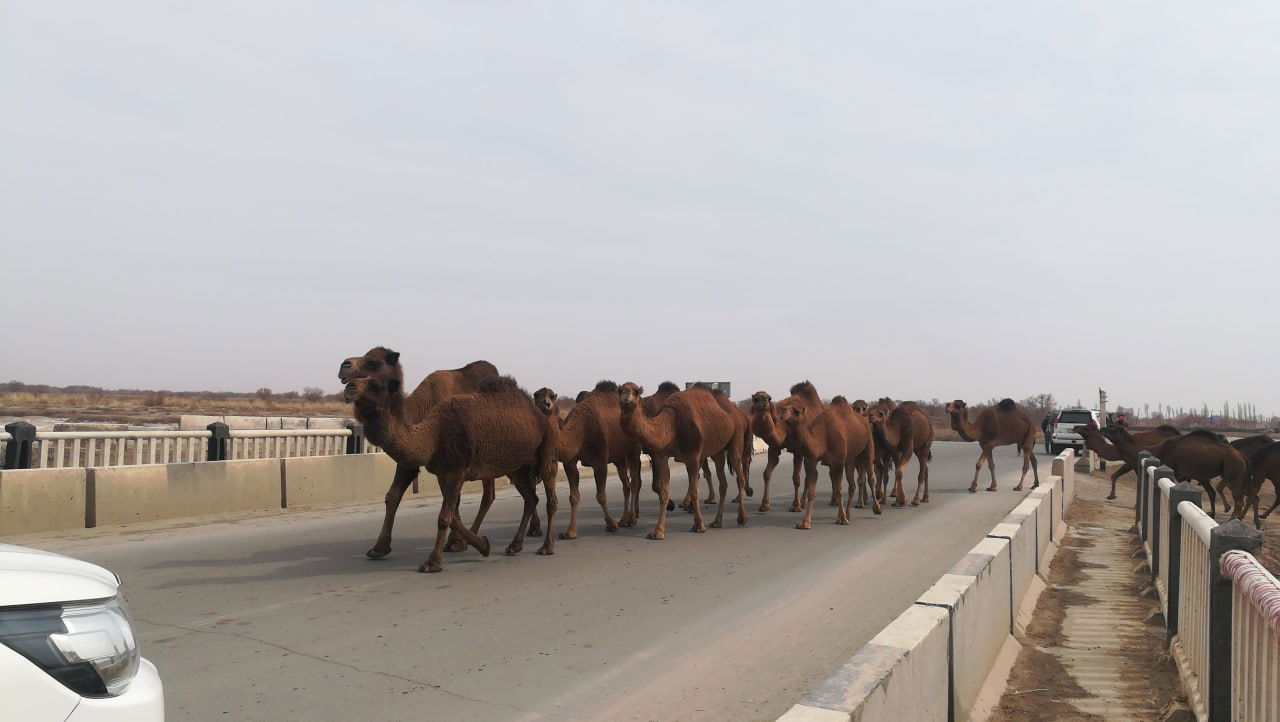
Our first stop was in Muynaq, the town that used to be a port on the Aral. Now the only thing left of its marine past are the pictures in the small local museum and nine rusted hulks of fishing ships that sit on the old sea bed far below the museum where, less than 40 years ago, waves were lapping the shore. It was a depressing site. “Yes, it’s normal that geography changes over time. But it usually takes centuries or even millennia. But what we have done to the Aral Sea has happened in one human lifetime,” Gab sighed. We were walking around the museum, looking at the photos of the once-thriving community, feeling depressed.
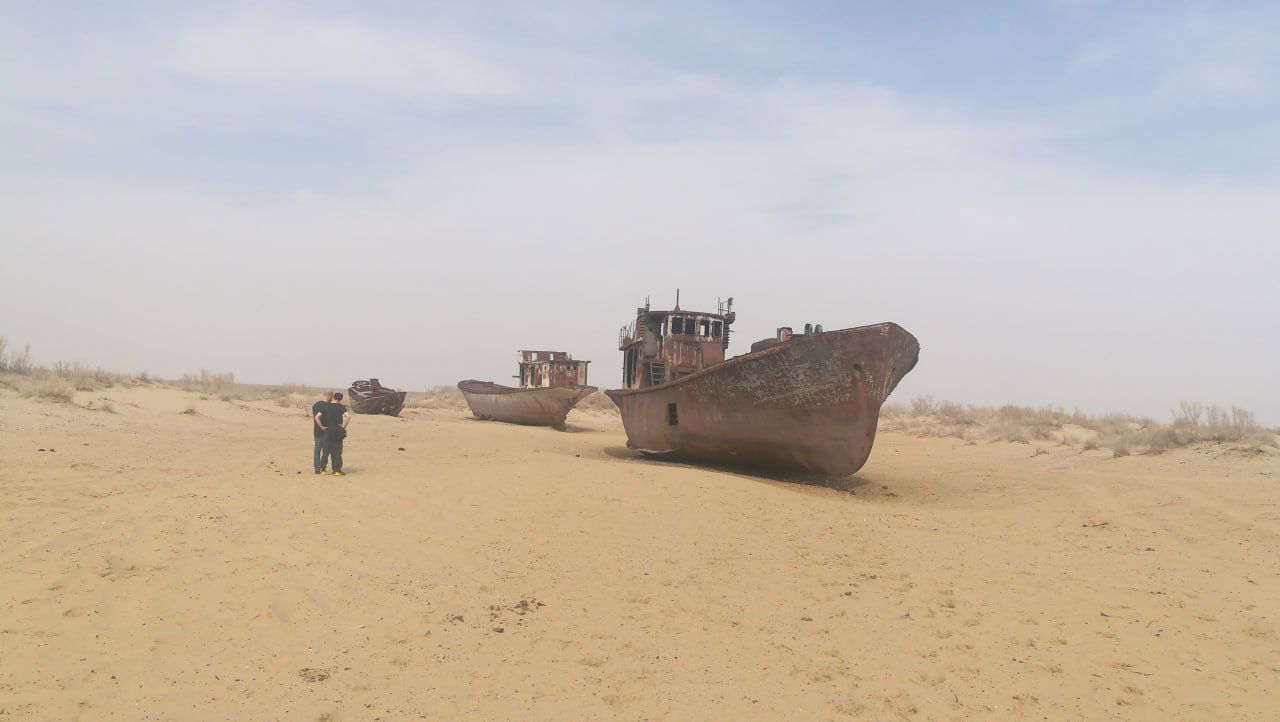
The evidence of this ecological catastrophe is visible as far away as Nukus. I remember the first time staring incredulously at huge swaths of ground seemingly covered with light snow. “What on earth is that?” Literally! This was my reflexive reaction to a thin layer of salt that is brought by the spring wind from the exposed Aral seabed.
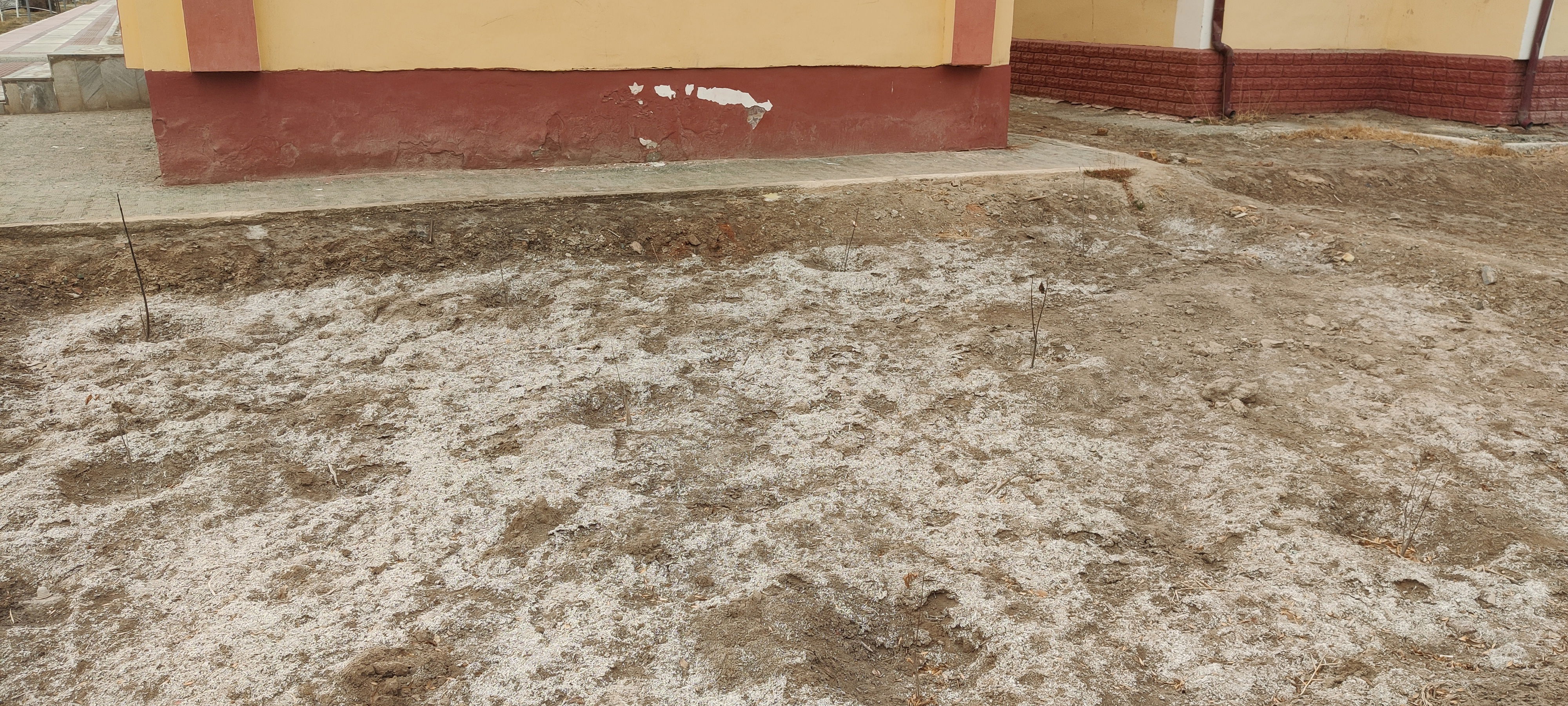
The bumpy dirt road across the seabed taking us from Muynaq to the shore of what is left of the sea took us past many natural gas extraction plants. Oil is sometimes referred to as ‘black gold’. The Soviets called cotton ‘white gold,’ and its production is largely responsible for the Aral Sea ecological disaster. “Is there any colour that goes with natural gas?” I voiced my musings into the car interior. Nobody responded.
“Check this out!” Dave pointed to his smart watch, with its fitness tracking app. On a good day, cruising around his classrooms, he can easily accumulate several thousand steps. He is thrilled if, after a good walk on top of that, the watch congratulates him on reaching fifteen thousand or more. The rocky road had gifted him fifty thousand unearned steps in no time! “So, what happens now? The watch sends you some virtual flowers with the congratulations?” I wanted to know.
For the entire duration of our trip we didn’t see our reflection in the mirror. The guest house in Muynaq where we had our first forgettable lunch, the museum devoted to chronicling the tragedy of the Aral Sea, the camp itself where we slept … none of these places had any mirrors to remind us just how grimy we looked after being exposed to sun and wind for two days.
When we finally arrived at our destination, all shaken up and dusty, it was dusk. The sea glittered in the remaining light, posing an unforgettable background to the nine yurts in the camp. Each of them was individually crafted, slightly different in size and shape. We had two yurts available to our group, each with four wooden cots. It was a hard toss-up. Should I sleep with Dave and his snoring, or with three other gals who would each most likely answer the ‘call of nature’ at least once a night? Neither of the option was ideal. In the end I opted to stay with Dave, forestalling his complaints of being abandoned.
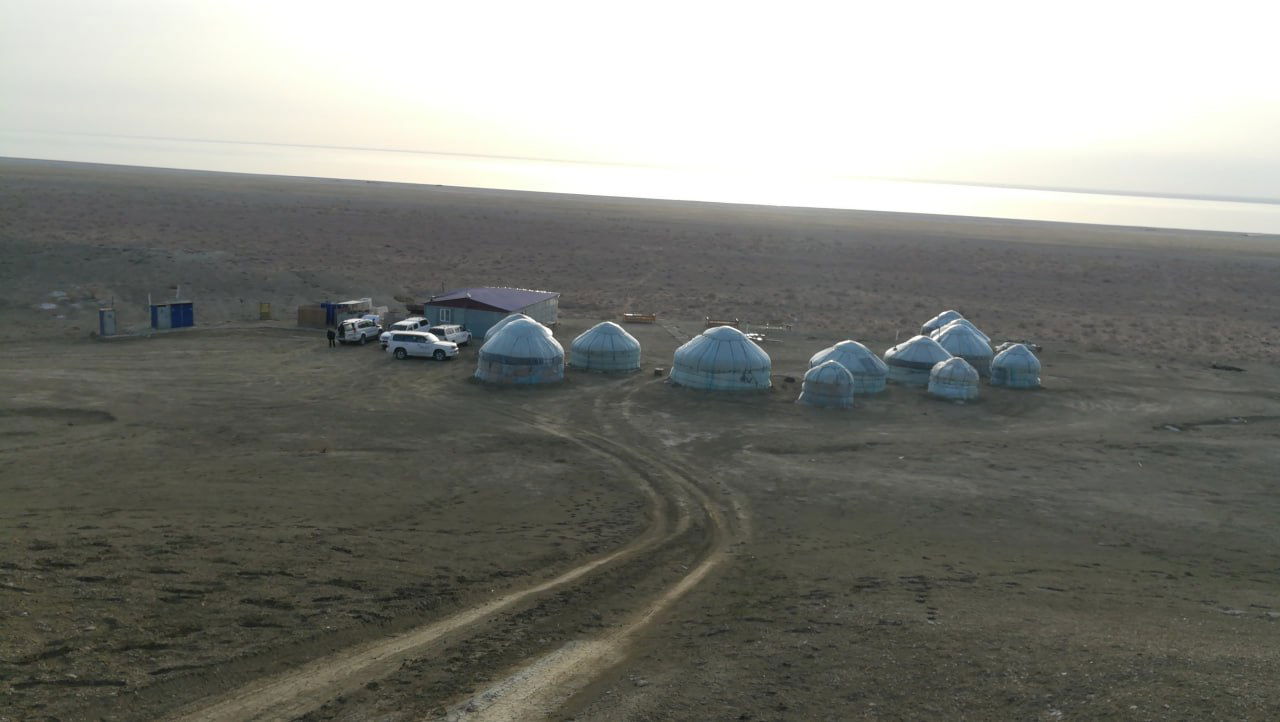
Our dinner was served in a long, low structure that served as a semi-permanent canteen. The building’s outside walls were all wrapped in plastic against the winds coming off the Aral, making it look like a hot-house cucumber protected by cellophane. Thank goodness the trip was not promoted as a wine- and local cuisine-tasting tour, I thought, while eating our second forgettable meal of greasy potatoes and a chicken drumstick. What was lacking in taste, fortunately, was more than made up by the companionship. All our companions turned out to be very laid-back, with a good sense of humor. When I met Mary for the first time, we ended up in my favorite café on the main square. While sipping our cappuccinos she told me about her family of five kids and one husband. “You could have your own volleyball team,” was my reaction.
“Yes, I know it’s unusual. We didn’t plan it that way,” she laughed and took another sip before continuing. “The first one was planned. The second boy as well. But then came the twins. And the last one was ‘Oops’.”
I immediately liked her down-to-earth attitude towards life and its surprises. She did not disappoint me during our trip. While I was searching in vain for some spice, to make the potatoes more palatable, Mary told us about her culinary experiences when her youngest son was growing up. “So traditionally every child could choose his or her birthday dinner. The twins were the easiest. But our youngest was born on the 25th of December. For several years while he was a kid, we would celebrate Christmas with hotdogs and popcorn.” We all laughed appreciatively and, had we not been so tired from a full day of impressions, we would gladly have continued our chatting. But we had another day awaiting. It was time to experience night in the yurt.
Each yurt had a wood stove in it made of a metal barrel with the top sealed by what looked to be a mixture of rough sand and mud. A metal pipe going through the roof served as a chimney. “It can get very cold here,” Kamal assured us earlier. “You are lucky. Today, there’s no need for fire.” I questioned him inwardly during the night when I woke up shivering, forcing me to snatch another blanket from an unoccupied cot next to mine.
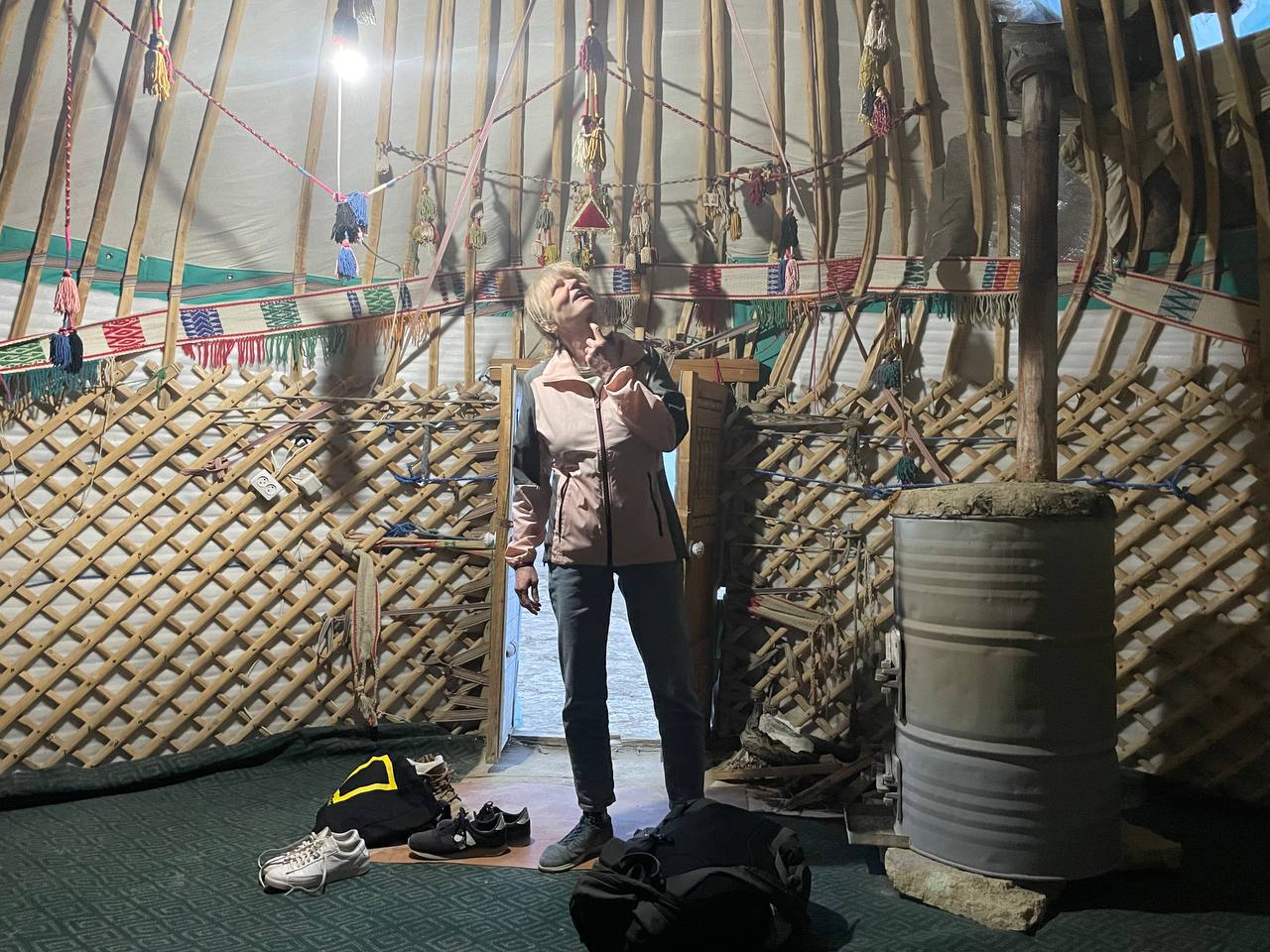
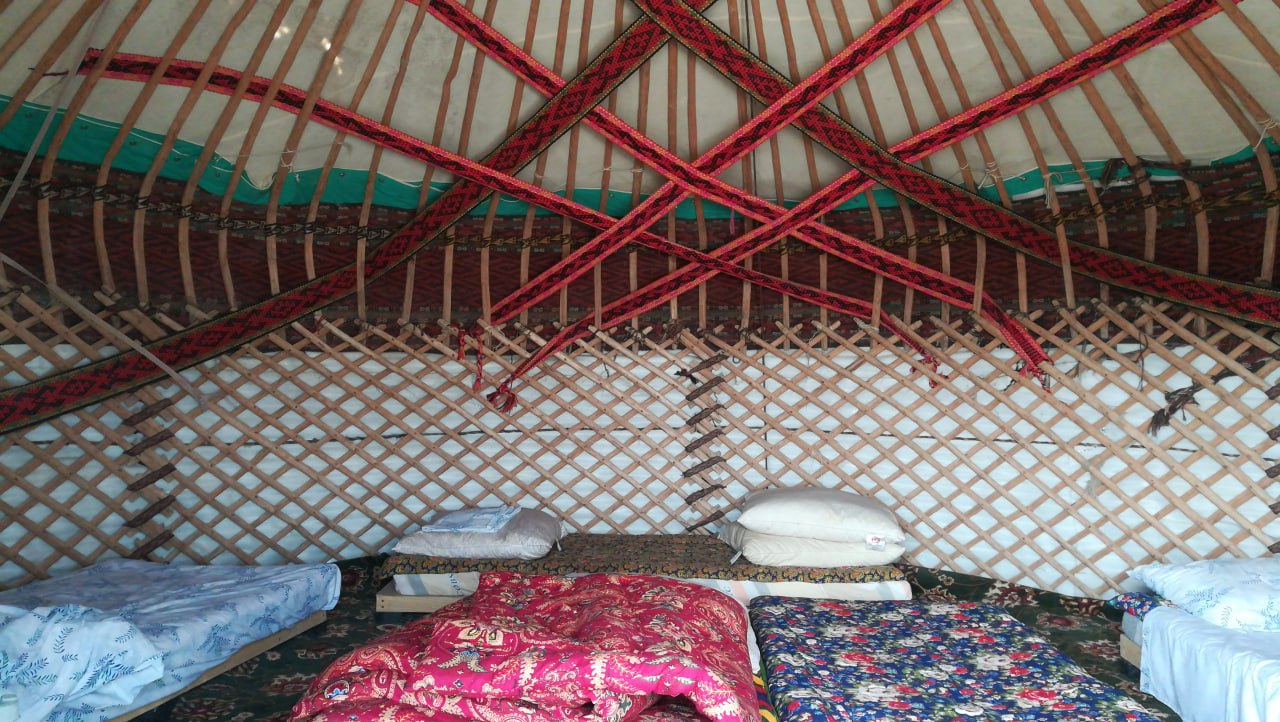
When I woke up the following morning the yurt was surprisingly dark, with only a sliver of light around the door frame. I remained under the two thick blankets for a while, refusing to get up into the bitter cold. But then hydraulic pressure forced me out. The timing was perfect. At 6:30 the sun was just rising above the sea. The generator had not kicked in yet, making the place eerily quiet with only a murmur of voices coming from Dave and Dina who were already perched on the bench facing the sea with their cameras ready.
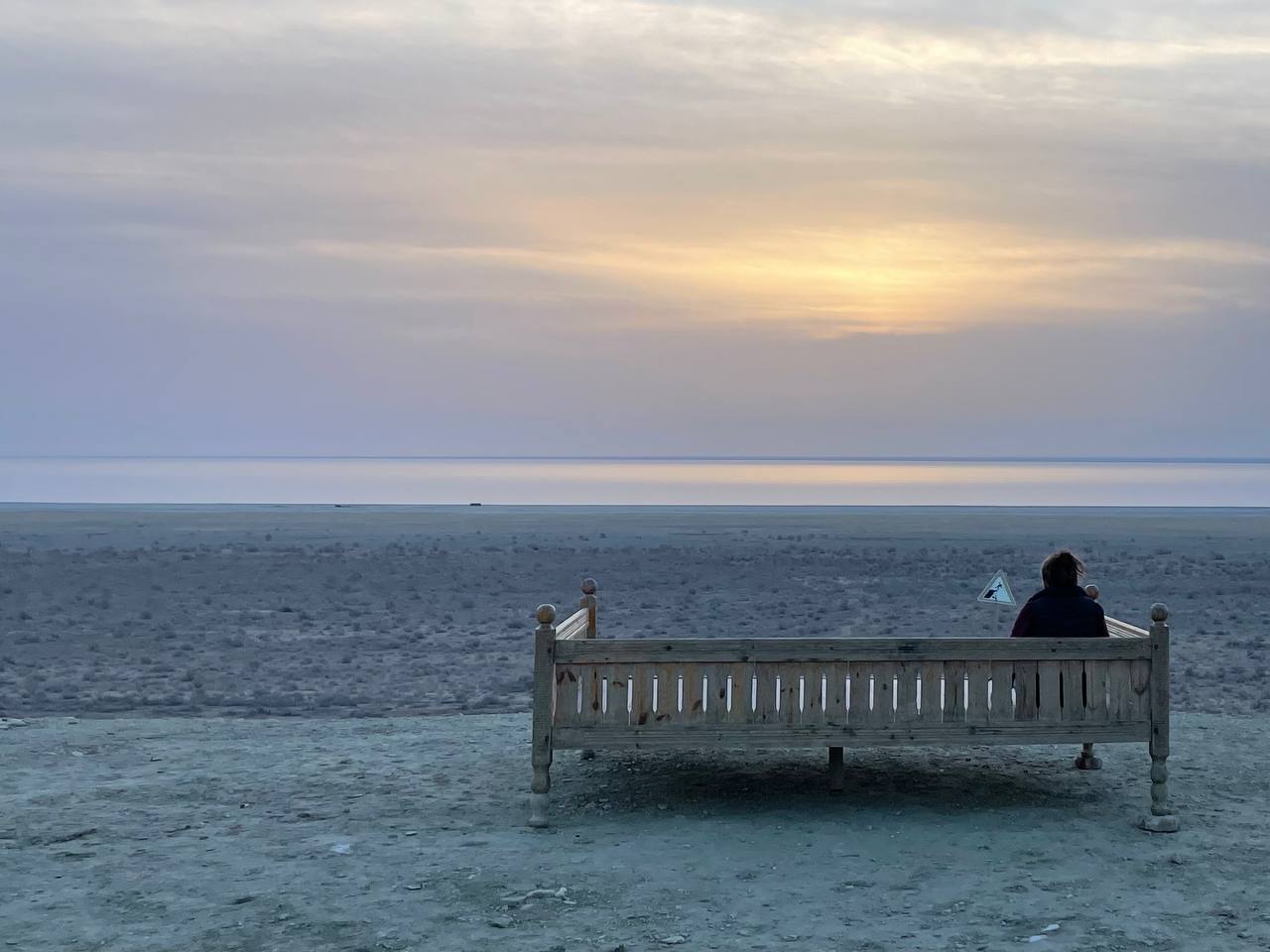
After snapping a few pictures of the sun rising from the shimmering sea with my phone camera, woefully inadequate for this occasion, I set out to explore. The sandy area had many smallish cabbage-like plants with tough looking leaves. I could only imagine how, in May after a couple of rains, the entire area would turn into a giant cabbage patch. On our way to the sea Kamal told us how the desert turns green for a short while, only to be scorched back into its present yellowish-gray by the June sun. We were extremely lucky, since the area tends to be either too cold or too hot. We had masterfully squeezed our visit through a very narrow window. Only one week before our visit it was too cold and rainy, making the French couple who had preceded us a bit miserable. “We couldn’t get close to the sea. The tires were sinking into the mud too much. The French people I think were disappointed.” Kamal told us. Yes, I would be too, if I were that close to the sea and couldn’t dip my toe in it to assure myself that I was really there. As it was, we too had difficulty for the last one hundred meters. Nothing like the French people, but still … This was definitely not a regular seaside. We had to take our shoes off and wade through some very dark mud that was sticking to our feet like Play-Doh.
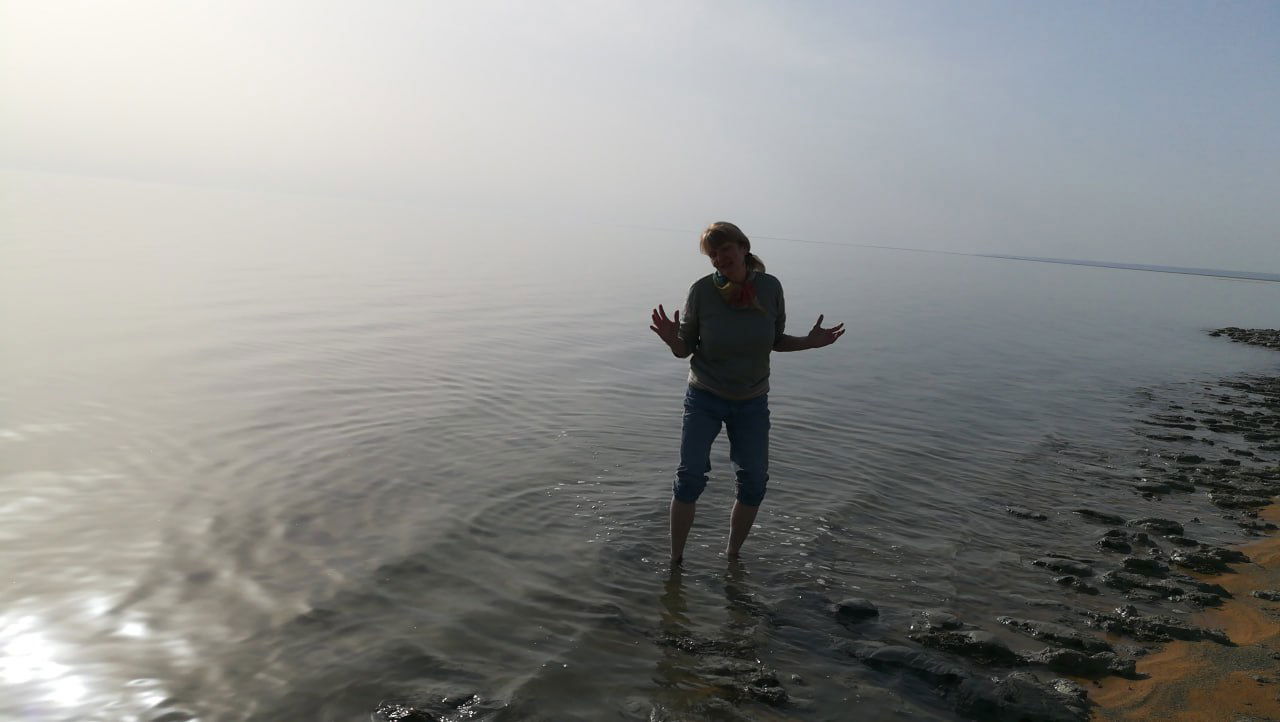
“Maybe they could start using it for cosmetics, like the Dead Sea mud face masks,” suggested Mary.
“I don’t know. Look at my rash. I am probably Patient Zero here.” Gabriella pointed to her red calves.
“Have you ever tried the Dead Sea scrub?”, I asked.
“No. Too expensive. Had to pay most of my way through school.”
“Yeah. Maybe you shouldn’t, then. It looks like you really reacted to this mud.” I dipped my finger into the water and licked it. It was not as salty as the Dead Sea but salty enough to ensure that, if it could survive, any fish would come out already seasoned. I looked far to the right. Barely visible were about fifteen old-fashioned canvas tents. I recalled what Kamal told us earlier, “They harvest what? Artemia???” was our initial response. Apparently, Artemia is the proper name for the tiny brine shrimp, which favours very salty water. “The hunters drink and sleep during the day, and at night they use lights to attract and collect the creatures. They are harvested for their color, used in cosmetics. The export goes mostly to China and Korea,” Kamal told us.
The ‘hearty breakfast’ promised in the tourist brochure turned out to be hard boiled eggs, bread and yogurt. As with the dinner, there were no condiments provided.
“Seriously, do they expect us to use the salt that covers the ground everywhere around here?” Dave complained.
“They are sparing you. They know you are a salt addict, and you are getting too much just breathing this air,” I offered my consolation. Had I known that it was going to be our last meal for the next seven hours I would have stocked up more on the tasteless provisions.
After a last farewell to the sea and the yurts we set off for our next stop. According to Kamal, Sudochie Lake was supposed to be something of an ornithologist’s paradise. As I was looking around, scanning the bullrushes for some signs of life, I thought that calling it a 'paradise' was stretching things. Unless, of course, the bird person had been denied entry to any better version, perhaps because of being naughty by hogging the discovery of some rare bird in his own backyard. But, in the end, it took only one sight to make the visit worth the price of admission.
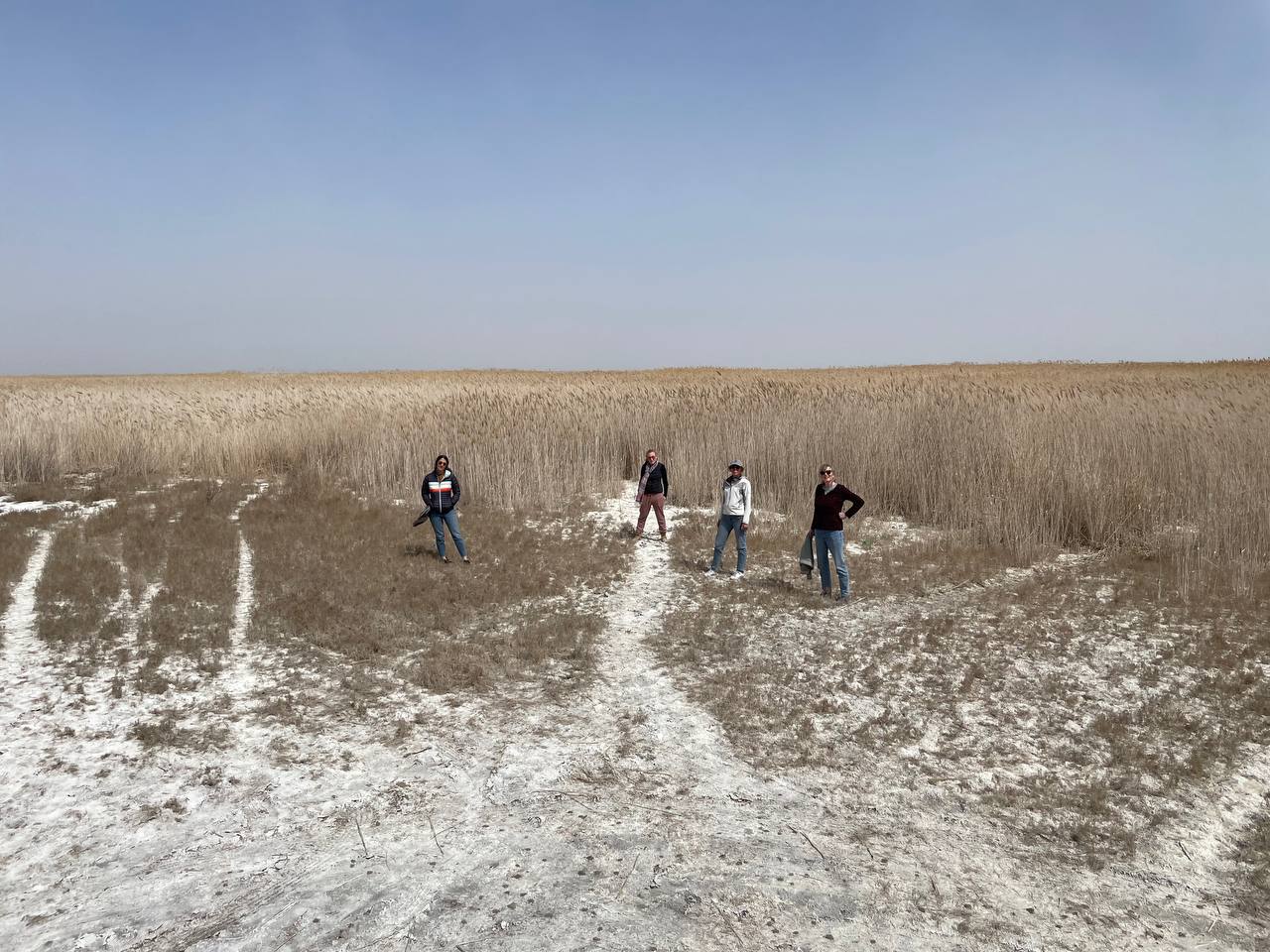
“Look above,” Gab pointed above my head. Seven flamingos were gliding high above with their pink bodies and black tipped wings silhouetted against the sky. Their beauty made a stark contrast to the remnants of the gulag positioned right below them. “It was built by the Polish prisoners,” Kamal provided more details of the grim setting. Having read Solzhenitsyn’s ‘Gulag Archipelago’ in my youth, I was aware of the Siberian gulags. The fact that Uzbekistan had some gulags as well, though, surprised me. “Yes, a friend of my sister visited Uzbekistan several years ago, trying to find some information about his grandparents. They must have been imprisoned in some similar place when they died,” Gabriella shared while we were looking around.
The Ustyurt plateau separates the Aral Sea from the Caspian Sea. We travelled on it for several hours, heading back to the small town of Kungrad. The wind on the plateau was at times threatening to blow our cars off to neighboring Kazakhstan. On the windy plateau our two cars often split so that neither had to eat the other’s dust. Ours was often skirting the plateau’s edge, providing a spectacular view of the canyon while unleashing huge flights of stomach butterflies.
No matter where you are, how many hours you sit in the car, and how little you drink in dreaded anticipation of the consequences, eventually Nature will call. Dina and I seemed to have become synchronized in these needs. We started in the morning modestly waiting outside the still civilized museum washroom but, as the day progressed, our reservations were blown away by the wind.
“Do you have any paper left?” I asked Dina as I got up from my squat only a few meters away. “What’s the wind direction? I don’t want to pee my shoes.” She asked earlier. Harsh conditions make for fast friends.
I always felt it highly unfair that it’s much less convenient for women to go to the washroom and yet, ironically, the frequency of their need is much higher than men’s. They are hampered by their own reluctance to be seen squatting, thus admitting that, yes, they are peeing. Guys don’t have any such qualms. They will stand by the side of the road, with their backs to the traffic, feeling totally comfortable. “Buddy, do you really think that people don’t know what you are doing there?” I often think. Women are not like that. They’d rather waste ten minutes of their lives searching for some bush to hide the fact that they are squatting. Of course, all this goes out the window when the conditions get rough. Many years ago, when we lived in the UAE, I participated several times in an annual relay race. It was a grueling all-day affair that would take the teams across the mountain range separating the Persian Gulf from the Indian ocean. Each car needed at least two people who could not only run but also drive across the rough mountainous terrain. Usually, our team of five had another person besides me who had the need to squat when nature called.
I still chuckle remembering how, on the morning of the race, the two of us would start with a modicum of modesty. When the car stopped to switch the runners, if in need, we would run even several hundred meters to find some suitable boulder. That all changed as the sun kept moving across the sky and the runners covered more distance. Towards the end of the day, with all participants dusty, tired and not caring all that much anymore, any excuse for a rock would do. We would squat behind a grazing goat if necessary, pretending we were invisible to all the cars passing by. I noticed the same tendency during our Aral Sea trip. Give us one more day of roughing it, and we’d probably end up just squatting by the car. Luckily, it was only a two-day trip, so we were spared.
“Do you feel like we just spent a week travelling?” asked Dina while we were waiting our turn in front of the toilet back at the guest house in Nukus, where it all started.
“Yeah, I know exactly what you mean. We packed in so much, it just feels like a week. So, what’s our next trip?”
----------
Author's Note: If you have read this far, I can only assume that you are enjoying my missives. Please let your friends and family enjoy them too, by sharing the link (https://www.playful.blog), and reminding them to subscribe. Thank you!